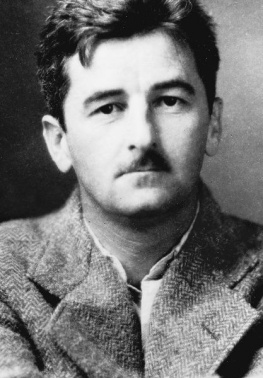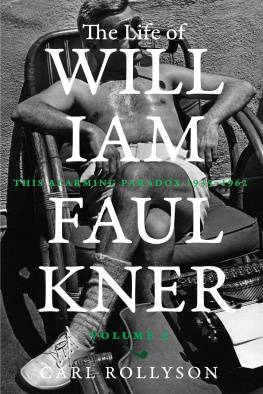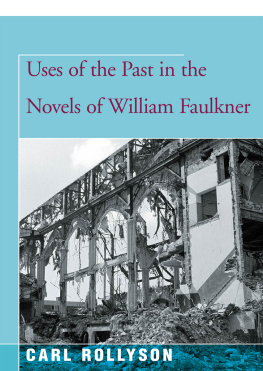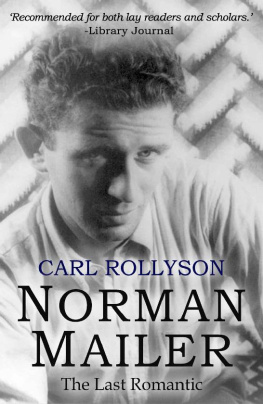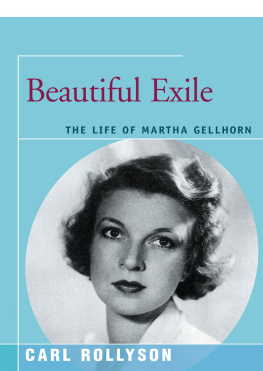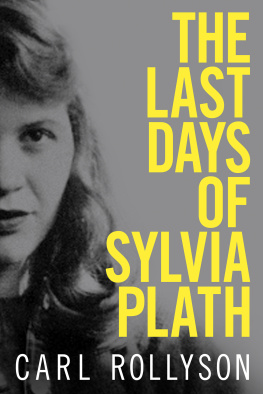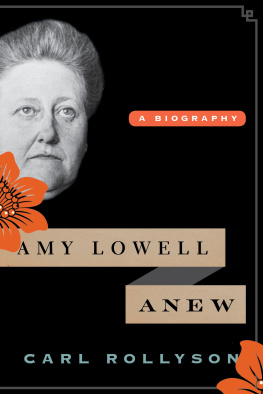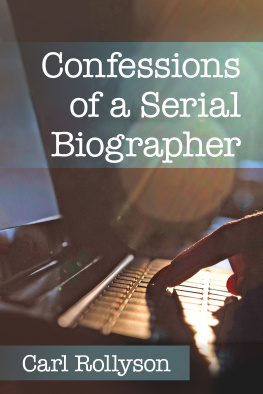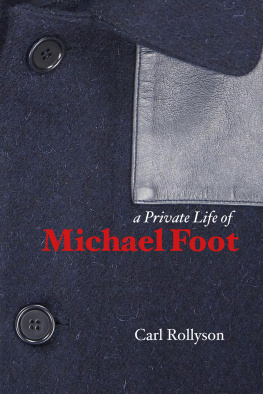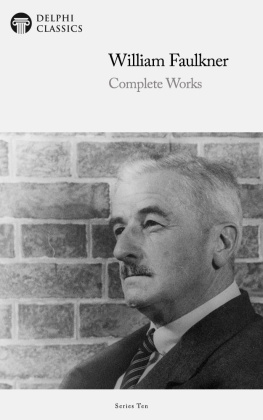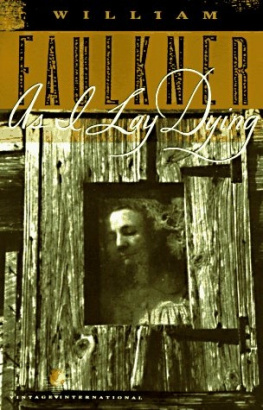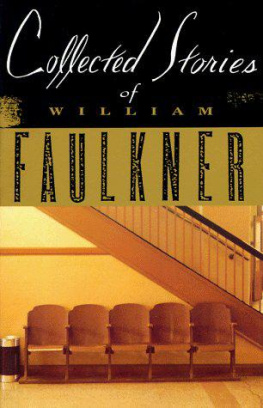Carl Rollyson - The Life of William Faulkner: The Past Is Never Dead, 1897-1934
Here you can read online Carl Rollyson - The Life of William Faulkner: The Past Is Never Dead, 1897-1934 full text of the book (entire story) in english for free. Download pdf and epub, get meaning, cover and reviews about this ebook. year: 2020, publisher: University of Virginia Press, genre: Non-fiction / History. Description of the work, (preface) as well as reviews are available. Best literature library LitArk.com created for fans of good reading and offers a wide selection of genres:
Romance novel
Science fiction
Adventure
Detective
Science
History
Home and family
Prose
Art
Politics
Computer
Non-fiction
Religion
Business
Children
Humor
Choose a favorite category and find really read worthwhile books. Enjoy immersion in the world of imagination, feel the emotions of the characters or learn something new for yourself, make an fascinating discovery.
- Book:The Life of William Faulkner: The Past Is Never Dead, 1897-1934
- Author:
- Publisher:University of Virginia Press
- Genre:
- Year:2020
- Rating:3 / 5
- Favourites:Add to favourites
- Your mark:
- 60
- 1
- 2
- 3
- 4
- 5
The Life of William Faulkner: The Past Is Never Dead, 1897-1934: summary, description and annotation
We offer to read an annotation, description, summary or preface (depends on what the author of the book "The Life of William Faulkner: The Past Is Never Dead, 1897-1934" wrote himself). If you haven't found the necessary information about the book — write in the comments, we will try to find it.
The Life of William Faulkner: The Past Is Never Dead, 1897-1934 — read online for free the complete book (whole text) full work
Below is the text of the book, divided by pages. System saving the place of the last page read, allows you to conveniently read the book "The Life of William Faulkner: The Past Is Never Dead, 1897-1934" online for free, without having to search again every time where you left off. Put a bookmark, and you can go to the page where you finished reading at any time.
Font size:
Interval:
Bookmark:
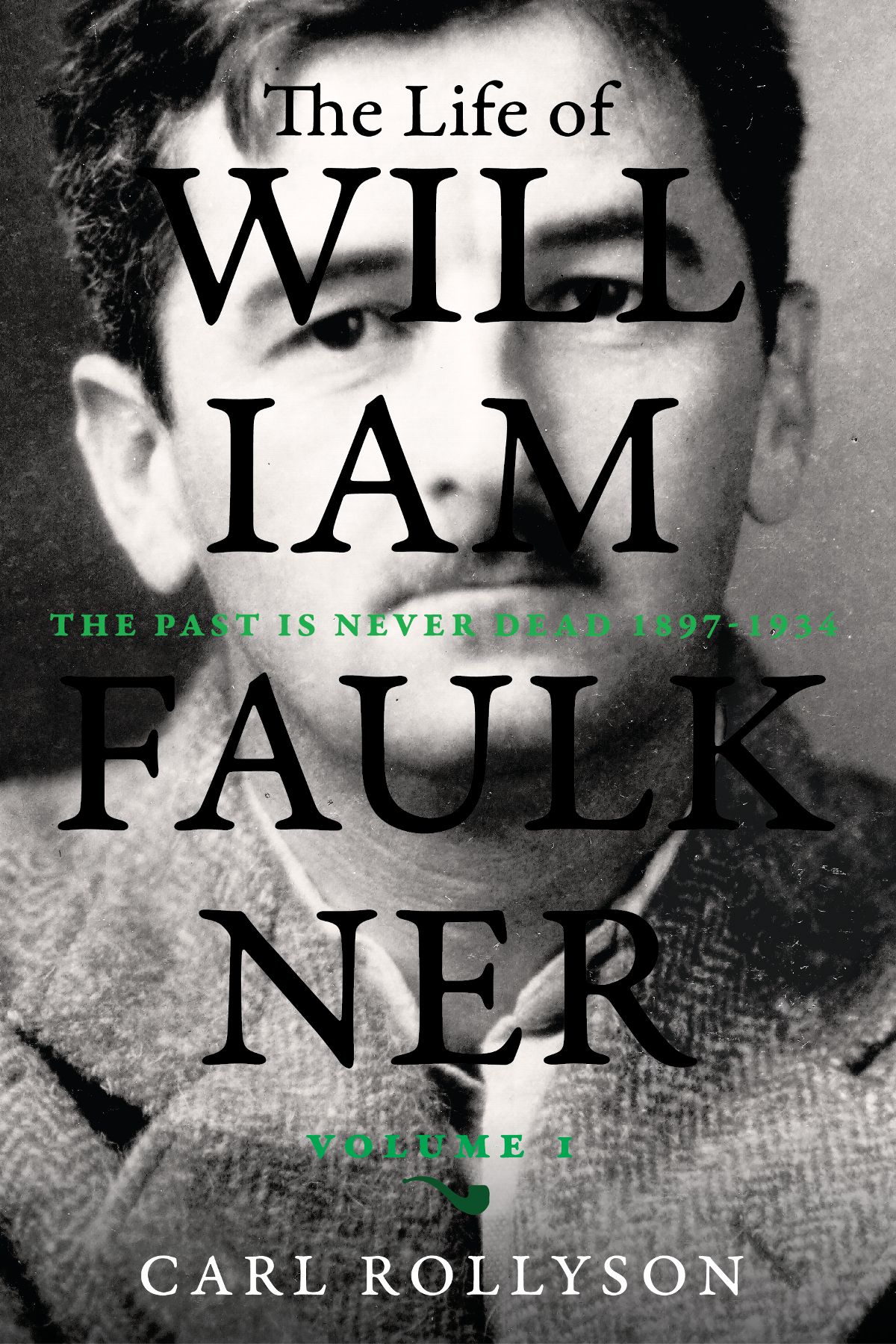
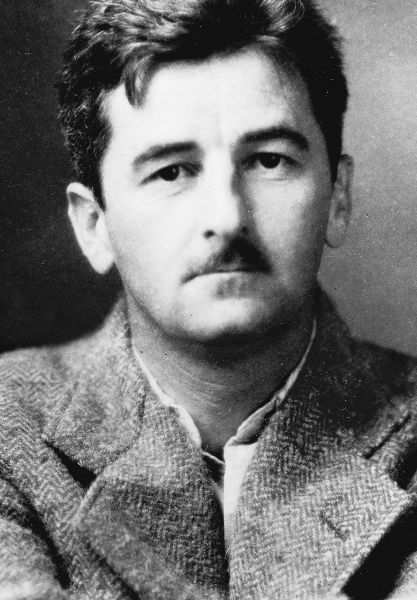

Carl Rollyson
University of Virginia Press
Charlottesville & London
University of Virginia Press
2020 by Carl Rollyson
All rights reserved
Printed in the United States of America on acid-free paper
First published 2020
1 3 5 7 9 8 6 4 2
Library of Congress Cataloging-in-Publication Data
Names: Rollyson, Carl E. (Carl Edmund), author.
Title: The life of William Faulkner / Carl Rollyson.
Description: Charlottesville : University of Virginia Press, 2020. | Includes bibliographical references and index. | Contents: Volume 1. The past is never dead, 18971934.
Identifiers: LCCN 2019032254 (print) | LCCN 2019032255 (ebook) | ISBN 9780813943824 (hardback ; volume 1) | ISBN 9780813943831 (epub ; volume 1)
Subjects: LCSH: Faulkner, William, 18971962. | Authors, American20th centuryBiography. | Novelists, American20th centuryBiography.
Classification: LCC PS3511.A86 Z9619 2020 (print) | LCC PS3511.A86 (ebook) | DDC 813/.52 [B]dc23
LC record available at https://lccn.loc.gov/2019032254
LC ebook record available at https://lccn.loc.gov/2019032255
Cover art: Faulkner in 1931. (William Faulkner Related Material from the Library of William Boozer, Albert and Shirley Small Special Collections, University of Virginia Library)
I would have preferred nothing at all prior to the instant I began to write, as though Faulkner and Typewriter were concomitant, coadjutant and without past on the moment they first faced each other at the suitable (nameless) table.
William Faulkner to Malcolm Cowley, February 18, 1946
Faulkner wrote as if there were no literature written in English before him, no century and more of convention and literary tradition established before he put pen to paper. He recreated fiction anew and set the novel free to better serve the twentieth century through a powerful, discordant, and irresistible torrent of language that crashed through time, space, and experience to tell the story of modern mankind in ways both tragic and comic. Faulkner would have written the way he did whether or not James Joyce, Virginia Woolf, Joseph Conrad, and the others had ever existed.
M. Thomas Inge, William Faulkner (Overlook Illustrated Lives)
The Big Dog Portrait of the Artist Two Mothers The Code of the Gentleman Father and Mother Oxford Love at First Sight Lynching Estelle
The Tramp The Poets Impresarios Love and War Northern Exposure Cadet Faulkner The Count The Catcher in the Rye
North Meets South New Orleans and the Marble Faulkner William Spratling and Other Famous Creoles Helen
Fascism and Everything Natural Man, the Gentleman, and War The Decadent Hero Faulkner and Anderson Finis Sherwood Anderson and Other Famous Creoles A Labor of Love Estelle and Other Entertainments The Dark Twin of a Man
Improving on God A Crossing A Breakthrough Risorgimento in Yoknapatawpha Hark: A Coming Man
The Prince and the Pauper Mr. Bill, Billy, and Pappy The Strangest of Honeymoons Family Man
Southern Decadence Benjy Quentin Jason Dilsey Estelle Maud The Lost Cause Alone
Family Disasters The Technics of Art and History Byronic with a Touch of Mark Twain
Rowan Oak The Novelist Rebuilding and Revising
A Death in the Family Writing Like a Devil The Home Touch of Interest
Doing the Work of Global History The Hound Dog under the Wagon
Homebody Scenarist
The Past as Prologue The Good Nigger Toward a New Kind of History
Hollywood Field Hand The Most Anticipated Motion Picture of the Current Season An Amateur Who Does Not Truly Know His Way About Conventional Attributes and Uncontrollable Desires Power
Pappy without a Pencil Dark Houses and Flying Visits Retrospectives and Prophecies On the Way to Sutpens Hundred Golden Land
Gallery follows page 234.
Why read another biography of William Faulkner? New facts, new interpretations. I also wanted to write in the light and dark of previous narratives. His biographers remain silent on what they do not know and retreat to what must have been. Long stretches of even the longest biographies have not told me what I want to know. What did it mean to Faulkner to expend so much energy not only on his fiction but on his screenplays? What did his wife, Estelle, think, and what was she doing at crucial periods when only her husbands testimony is available? What is a biographer to do with her erasuresometimes self-inflicted?
As in a Faulkner novel, it is important to preserve the mysteries and not to pretend to know what is not or cannot be known, although, like his characters, I speculate, submitting questions that perhaps others will be able to answer or clarify. Identifying gaps in the evidence can reveal as much about Faulkner as what can be sourced. Minor figures abound because they reveal sides of the quotidian man ignored in previous biographies. I am that species of biographer who believes in presenting the whole man, not just those aspects of his life that pertain to the literary figure.
Although, like most biographers, I take a chronological approach, at times I backtrack, flash back, and flash forward because, as Faulkner said, all of time is inherent in every moment of timethe past, the present, and what is to come. To never deviate from chronology is to suppose life is a matter of just one damn thing after another. Even if that is so, books should not be so. Too many times stories are interrupted in a biography simply because of what happens next. Sometimes chronology has to be broken badly in order for the story to survive.
Like my predecessors, I owe an enormous debt to Joseph Blotner. Some paragraphs of this biography would need a note to Blotner for nearly every sentence, and that would be tedious and counterproductive. So I have not notated facts and details derived from Blotners two-volume and one-volume biographies, but in many cases I have cited his papers, when I can access the raw data that he later transformed on the printed page. Blotner, for a whole
They needed protection, she made clear, from another biographer: Carvel Collins, whose immense collection at the University of Texas is a treasure of primary sources, including interviews with people who had passed away by the time Blotner began his work. Judging by the notes in previous biographies, I am the first biographer to look at every one of the 105 boxes in the Collins collection. His interviews often corroborate Blotner but also add a good deal of texture to this biography. Collins began in the late 1940s to collect everything. By the summer of 1967, he had made more than thirty visits to Oxford, Blotner routinely offered to remove material that offended his sources.
As for the other biographers, they all have their uses. Anyone wishing to understand Faulkners southern background and family history had better read Joel Williamson. For acute psychological analysis, Fred Karl is the go-to biographer. Judith Sensibar restores Estelle Faulkner to an importance that other biographers have occluded. The reasons for her eclipse have their origins in Joseph Blotners reluctance to press her on several important issues. It is true that I felt the need for tact, not only because she had been a faithful friend, and I think, generally a good informant, but for Jills sake too, Blotner wrote to fellow scholar Floyd Watkins. In a way, for his [Faulkners] sakeyou can imagine my feelings of general ambivalence writing an intimate account of the life of my friend who in life had trusted me and whose trust I had tried to deserve. No subsequent biographer had Blotners access to Estelle, who died in 1972.
Font size:
Interval:
Bookmark:
Similar books «The Life of William Faulkner: The Past Is Never Dead, 1897-1934»
Look at similar books to The Life of William Faulkner: The Past Is Never Dead, 1897-1934. We have selected literature similar in name and meaning in the hope of providing readers with more options to find new, interesting, not yet read works.
Discussion, reviews of the book The Life of William Faulkner: The Past Is Never Dead, 1897-1934 and just readers' own opinions. Leave your comments, write what you think about the work, its meaning or the main characters. Specify what exactly you liked and what you didn't like, and why you think so.

